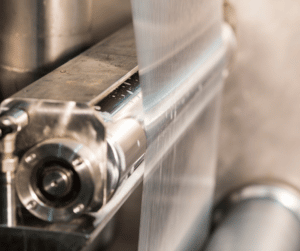The key mechanical properties of plastic include stiffness, strength, hardness, and toughness. While these terms may all sound similar, each individual property is important in its own right. With decades of experience, trust Reading Plastic & Metal to explain the difference between strength and stiffness of plastics to ensure you choose the best material for your project.

Difference Between Strength and Stiffness
The stiffness of plastics is described by flexural modulus, or the ability of a material to bend, which is measured in pounds per square inch (psi). The higher the flexural modulus, the stiffer the material; the lower the flexural modulus, the more flexible it is. In addition to flexural modulus, the stiffness of plastics is sometimes referred to as flexural strength or tensile modulus. This mixing of terms can result in confusion as to the difference between stiffness and strength. The strength of a plastic, typically referred to as tensile strength or ultimate strength, is how much stress a plastic can withstand without breaking when it is stretched or pulled. Stiffness of plastic is the ability of the material to distribute a load and resist deformation or deflection functional failure.
Plastic Options to Choose From
Plastics with High Tensile Strength
- Nylon: With a tensile strength of 12,400 psi, Nylon is used in a wide array of applications, from clothing and rope to reinforcement in rubber material (such as car tires) and substituting for low strength metals. In addition to its high strength and excellent tensile properties, Nylon has a relatively high melting point (450ºF) and exhibits excellent abrasion resistance. It has high chemical resistance and is not damaged by oils, solvents, or alcohols.
- PAI (Torlon®): The ultimate high tensile strength plastic is PAI (polyamideimide), with an impressive tensile strength of 21,000 psi. This high performance plastic has good wear and radiation resistance, inherently low flammability and smoke emission, and high thermal stability. With the highest strength of any unreinforced thermoplastic, PAI parts can be found in jet engines, internal combustion engines, thrust washers, and printed circuit boards.
Plastics with Superior Stiffness
- Acetal – This stiff, low-friction engineering plastic is easy to machine and can hold complex, tight tolerances. Homopolymer acetal (Delrin®) is extremely stiff, with a flexural modulus of 14,300 psi, and provides superior wear and abrasion properties as well as excellent chemical resistance.
- PPS – PPS is most commonly known for having the broadest resistance to chemicals of any advanced engineering plastic. However, it also boasts an impressive flexural modulus of 21,000 psi. PPS maintains its stiffness over wide temperature ranges and has excellent hydrolysis resistance, high dielectric strength, advanced electrical properties, and a very low coefficient of linear thermal expansion.
Plastics with Strength & Stiffness
- PEEK – An all-around powerhouse, PEEK combines high stiffness (24,000 psi) and strength (14,000 psi) with outstanding chemical resistance and a continuous service temperature of 500ºF. PEEK also has superior creep resistance, excellent fatigue and stress-crack resistance, and very low moisture absorption.
- Ultem® – PEI resins such as Ultem® offer high stiffness and strength, superior elevated thermal resistance, and broad chemical resistance. With a flexural modulus of 22,000 psi, Ultem® offers predictable stiffness and strength up to 200ºC/392ºF. It also has great ability to process, is inherently flame resistant in most grades, and has excellent stress and cracking resistance when exposed to aircraft and automotive fluids, alcohols, acids, and more.
Reading Plastic & Metal Knows Strength & Stiffness
At Reading Plastic & Metal, we’re experts at machining the most advanced plastics on the market, including those with superior stiffness and high tensile strength. We not only help you select the appropriate material, we can also machine and fabricate your parts to hold tight tolerances. If you need help determining the right plastic for your application, reach out to us today at (610) 926-3245.
